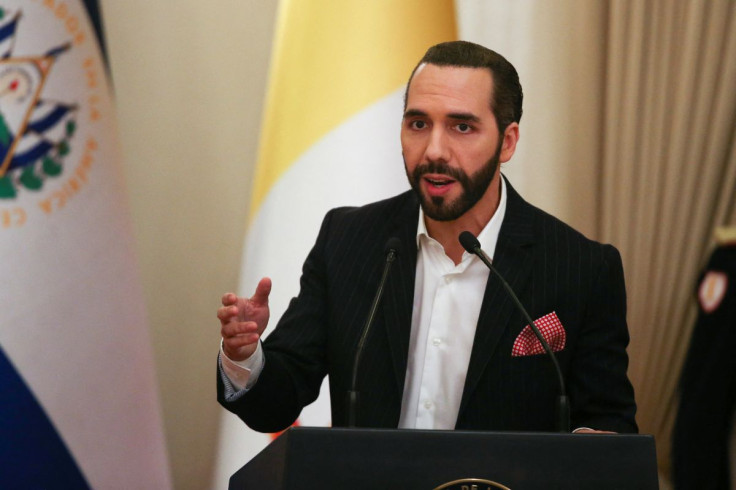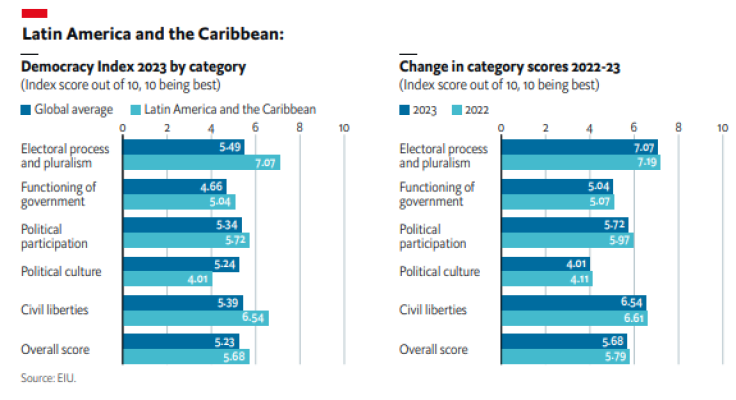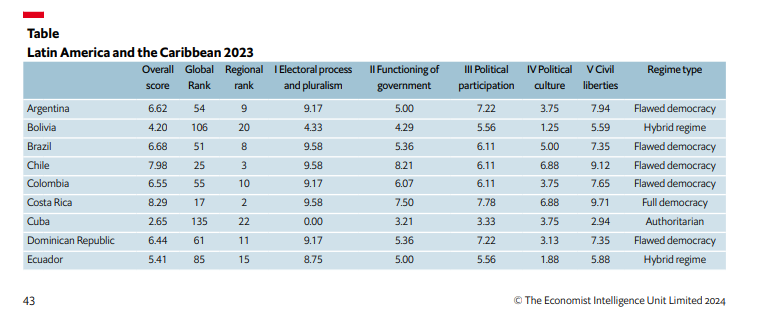
Democracy in Latin America and The Caribbean continued to backslide in 2023, posting a decline for the eight year in a row, according to the latest version of The Economist's Democracy Index.
The document, which has been tracking the world's democratic health for almost 20 years now, noted that the region is still the third-most democratic in the world, but highlighted that the challenges faced threaten to continue eroding its stance, especially those related to security.
The region is one of contrasts in this aspect, as it's home to two of the world's strongest democracies (Uruguay and Costa Rica, both in the top 20) but also "but also to a number of long-standing authoritarian regimes such as Cuba (135th), Nicaragua (143rd) and Venezuela (142nd), and to a country in a state of collapse, Haiti (129th)," the report said.
Of the 24 countries measured in the index, 16 showed a decline in their scores, three improved and five were unchanged. Overall, "little over 1% of the region's population live in a full democracy, a majority (54%) live in a flawed democracy, 35% in a hybrid regime and 9% in an authoritarian regime," according to The Economist.
The mentioned two countries are considered to be full democracies, while the rest are divided in flawed democracies (11) hybrid regimes (7) and authoritarian ones (4). Two countries saw a classification change: Chile, which went from full democracy to flawed one and Paraguay, which improved from hybrid regime to flawed democracy.
"Chile's downgrade was a result of increased preference for expert rule, according to the latest survey data," the report said, while Paraguay improved its score due to an "increase in female representation in Congress following the 2023 general election."
The Economist's biggest downgrade in the region was for El Salvador, a result of the "increasingly authoritarian rule and unconstitutional re-election bid of the president, Nayib Bukele."
However, all of Central America (excluding Mexico) showed the steepest decline in the index, driven by Nicaragua, Guatemala and Honduras, as well as El Salvador. "High levels of crime (largely related to drug trafficking) and the use of state repression in response have led to a consistent decline in the quality of democracy in most countries in the sub-region in recent years."
The report also focused on Guatemala's tensions last year, following a "nearly successful attempts by powerful factions of the country's elite to reverse the results of the second-round runoff of the country's presidential election."
Following Bernardo Arévalo's unexpected victory, factions within the country's elite and the judiciary attempted to prevent him from taking office, leading to "bouts of social unrest and further polarized an already deeply divided society." Even though the attempts were not successful and Arévalo did take office, The Economist warned that "governability will be extremely weak and democracy in Guatemala will remain on a knife's edge in 2024."

Argentina and Ecuador are other countries under the spotlight. While not marred by physical violence, The Economist noted that polarization reached new levels in the 2023 elections and the victory of right-wing libertarian Javier Milei.
Ecuador did face high levels of political violence, with the assassination of presidential candidate Fernando Villavicencio, among other bloody events leading to the victory of center-right Daniel Noboa.
Immersed in a fight with criminal organizations, Noboa declared an internal state of conflict, implementing measures that "pose significant risks to Ecuador's already weak democracy in 2024."
Finally, the report highlights that the region has avoided inter-state wars, events that have weighed heavily on democracies in other parts of the world recently. However, it referenced the tensions between Venezuela and Guyana over the Essequibo region as a warning sign even if a war seems still unlikely.
Latin American countries in The Economist's Democracy Index

© 2024 Latin Times. All rights reserved. Do not reproduce without permission.







